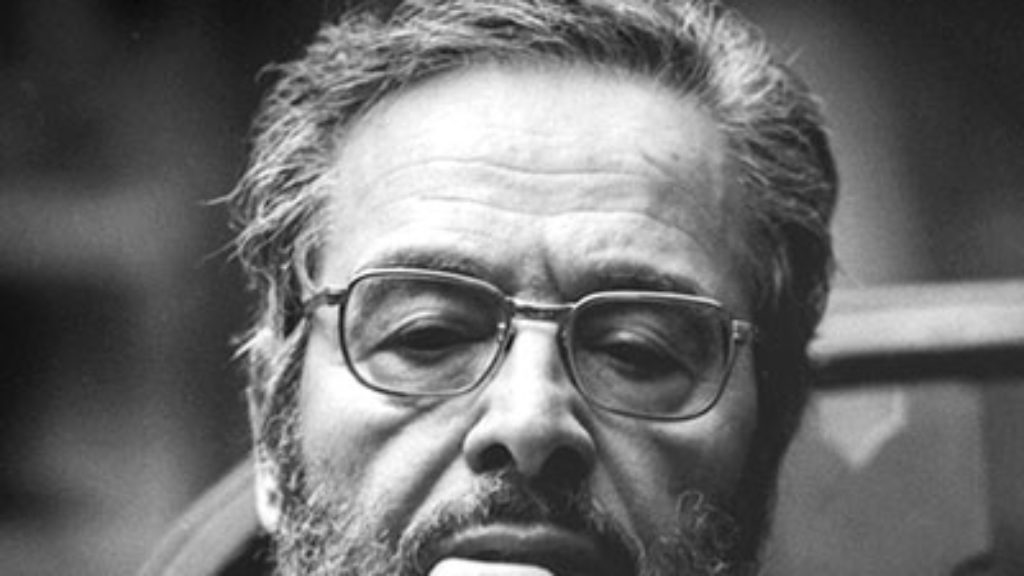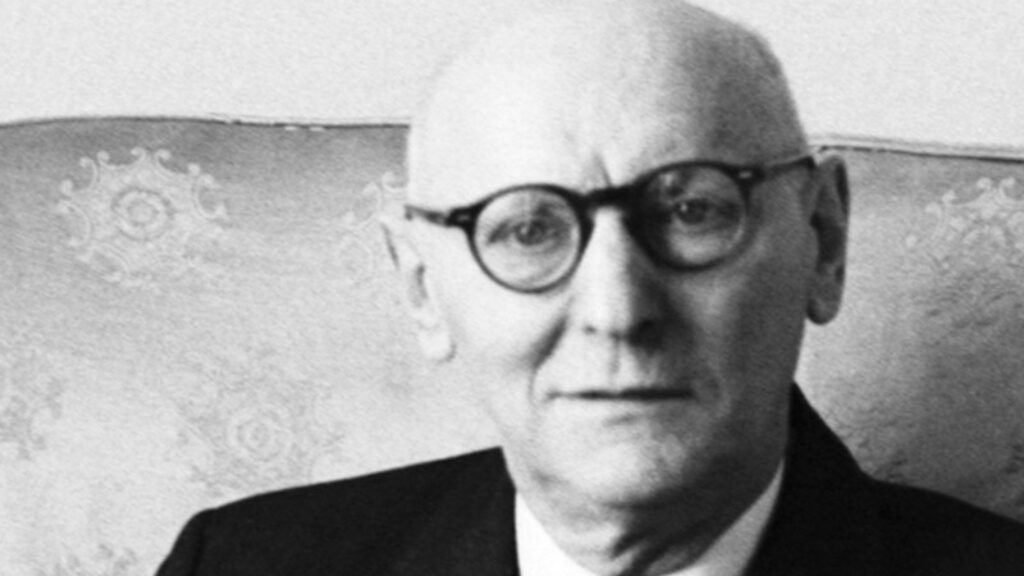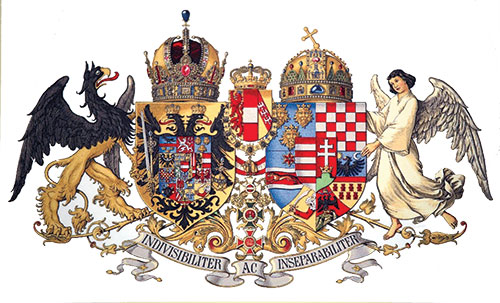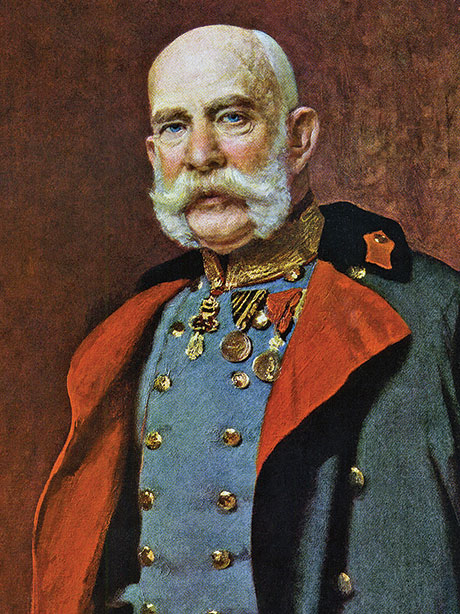Joseph Roth: Grieving for a Lost Empire
In Ostend, his book about the German and Austrian émigré literary group that gathered in the Belgian resort town after Hitler came to power, Volker Weidermann describes Joseph Roth, the most talented of these writers, looking “like a mournful seal that has wandered accidentally onto dry land.” Roth was small, thin yet pot-bellied, slightly hunched over, with a chosen nose, a bad liver, and missing lots of teeth. He began most mornings, like the serious alcoholic that he was, vomiting. Always in flight, one of the world’s permanent transients, Roth was a one-man diaspora: “Why do you people roam around so much in the world?” asks a Galician peasant in one of his novels. “The devil sends you from one place to another.”
Joseph Roth happens also to have been a marvelous writer, and he might have gone on to be a great one had he not died in 1939, in his 45th year. (He is of that uncharmed circle of writers—Chekhov, Orwell, F. Scott Fitzgerald—who died before they reached 50.) Not the least of Roth’s marvels was his astonishing productivity. In his short career between 1923 and 1939, he published, in German, no fewer than 15 novels, a batch of short stories, and, by his own reckoning in 1933, something on the order of 3,500 newspaper articles, most of them of the genre known as feuilleton, those short, literary, free-form, usually non-political essays that were once a staple in French and German newspapers. None of his writing that I have read, even the most ephemeral journalism, is without its felicitous touches, its arresting observations, its striking evidence of a first-class literary mind at work.

Roth’s work is bedizened with metaphor, laced with simile. In the short story “Strawberries” one finds: “The sun came out, as though back from holiday.” “Later they planted pansies on the lawn, beautiful big pansies with soft, clever faces.” Crows “were at hand like bad news, they were remote like gloomy premonitions.” In The Emperor’s Tomb (1938) there falls “a rough sleet, failed snow and wretched brother to hail.” In the same novel a landlady appears “as broad in the beam as a tugboat.” In The Radetzky March expensive “wine flowed from the bottle with a tender purr.”
A strong taste for aphorism and risky generalization runs through all Roth’s work. In his early novel Hotel Savoy (1924) one finds: “All educated words are shameful. In ordinary speech you couldn’t say anything so unpleasant.” “Industry is God’s severest punishment.” “Women make their mistakes not out of carelessness or frivolity, but because they are very unhappy.” In The Emperor’s Tomb we learn that “honor is an anesthetic, and what it anaestheticized in us was death and foreboding” and “to conceal and deny frailty can only be heroic.” Joseph Roth was a writer, as was once said of Henry James, “assailed by the perceptions.”
At the same time, Roth’s eye for detail is unerring. In a story called “The Place I Want to Tell You About,” a character, setting out for Vienna, remembers “the umbrella with the ivory handle” before leaving. That ivory handle puts one in the room. A minor character in The Radetzky March is “the father of three children and the husband of a disappointed wife.” Another minor character in the same novel reveals “a powerful set of teeth, broad and yellow, a stout protective grill that filtered his speech.” A woman in the story “The Triumph of Beauty” has “a long but unexciting chin”; a man in the same story has a large square torso that makes him look like “a wardrobe wearing a blazer.” Travelling in steerage to America the family at the center of his novel Job: The Story of a Simple Man sleeps along with 20 or so others, “and from the movements each made on the hard beds, the beams trembled and the little yellow electric bulbs swung softly.” In his preface to The Nigger of the Narcissus and “The Secret Sharer,” Joseph Conrad wrote: “My task which I am trying to achieve is, by the power of the written word, to make you hear, to make you feel, it is, before all, to make you see. That and no more—and it is everything.” Roth understood.
A second marvel is that Joseph Roth was able to get as much done as he did under the strained conditions in which he worked. The strain was financial. Roth was a money writer, less by temperament than by necessity. A spendthrift always hovering on personal pauperdom, he had the additional heavy expense of a wife who fairly early in his marriage had to be placed in various sanatoria for schizophrenia. (In 1940, Friederike Roth was removed from a Viennese hospital and murdered under the Nazis’ euthanasia program.) Much in Roth’s letters—published recently in English as Joseph Roth: A Life in Letters—is given over to pressing publishers and newspaper editors for the payment of advances or for raising his fees, complaints about his barely scraping by, and the expressions of guilt because of his need to borrow from friends, chief among them the commercially much more successful Stefan Zweig, who was his dearest friend and practically his patron.
Many of Joseph Roth’s novels are of modest length, some barely beyond that of the standard novella. (His final work, The Legend of the Holy Drinker, published in 1939, runs to 49 pages.) The four of these novels I find most accomplished are Right and Left (1929), Job: The Story of a Simple Man (1930), The Emperor’s Tomb (1938), and, the lengthiest and most fully realized, The Radetzky March (1932). An account of life under and a tribute to the Dual Monarchy, as the Austro-Habsburg dynasty was also known, The Radetzky March is one of those extraordinary works of fiction that, like Lampedusa’s The Leopard, cannot be anticipated by what has gone before in its author’s oeuvre. (Michael Hofmann, Roth’s ablest translator and most penetrating critic, writes of “the accelerated development otherwise known as genius.”) The novel’s title derives from Johann Strauss’s famous march and is one of those books that when two people meet who discover they have both read it sends a pleasing shock of recognition between them, followed by the bond of mutual admiration for an extraordinary work of literary art.
The range and variety of Roth’s fiction are impressive. That fellow in Eliot’s great poem might have done the police in different voices, but Roth in his fiction could do poor shtetl Jews and the Emperor Franz Joseph, Polish nobles and Ruthenian peasants, down-and-outs and successful entrepreneurs, Romanians, Czechs, Poles, Germans, Cossacks—in short, the entire Austro-Habsburg Empire, and all in perfect pitch.
Moses Joseph Roth was born in 1894 in Brody, a Galician town of roughly 18,000 people, two-thirds of whom were Jewish, on the border between Poland and Ukraine, 54 miles north-east of Lemberg (now called Lviv). He never knew his father, who died in a mental asylum. In 1913 he earned a scholarship to the University of Lemberg, and after a year there went on to the University of Vienna, where he dropped the Moses from his name and claimed his father was (variously) a Polish count, an Austrian railway official, an army officer, and a munitions manufacturer; at one point he took briefly to wearing a monocle; later he would claim to have been an officer, not the enlisted man that he was in the First World War. All this in the attempt to shed the identity of the Ostjude, then held in much contempt in Vienna. This outsider, outlander even, became the great chronicler, and eventually the prime mourner, for the Dual Monarchy, later in life declaring himself a monarchist. On his gravestone in a cemetery outside Paris the words “Écrivain Autrichien” are engraved.
Of the cards dealt at birth, not the least significant is that of the time into which one was born. Here Roth drew a poor card. He came into his majority with the onset of the Russian Revolution and the First World War—“world,” as a character in The Emperor’s Tomb says, “because of it, we lost a whole world”—and left it as Hitler was gearing up the machinery for his Final Solution. (Communism, he noted in a letter to Zweig, “spawned Fascism and Nazism and hatred for intellectual freedom.”) Meanwhile, the First World War, the Russian Revolution, and the Treaty of Versailles finished off the Dual Monarchy, reducing what was once a sprawling empire to a shriveled Austrian Republic. The multitudinous fatherland Roth knew as a young man evaporated in the fog of nationalism. In his splendid story “The Bust of the Emperor,” Roth quotes the Austrian playwright Grillparzer on the fate of the Dual Monarchy: “From humanity via nationality to bestiality.”
What Roth valued in the Austro-Habsburg Empire was the fluidity it allowed its subjects, who could travel from country to country without the aid of passports or papers, and its discouragement of nationalism, which worked against the nationless Jewish people. “I love Austria,” he wrote in 1933. “I view it as cowardice not to use this moment to say the Habsburgs must return.” In 1935 he wrote to assure Stefan Zweig that “the Habsburgs will return . . . Austria will be a monarchy.” Before the approaching Anschluss of 1938 he even attempted, through the offices of Kurt Schuschnigg, the chancellor of the Federal State of Austria, to restore the monarchy by installing Otto von Habsburg, heir of the Emperor Franz Joseph, on the empty throne.
Not that there wasn’t anti-Semitism, that endemic disease, under the Dual Monarchy. Nor was it absent in France, where, after Hitler came to power in Germany in 1933, Roth lived out his last years, but, as he wrote in a strange little book called The Wandering Jews (1927), there “it is not one hundred proof. Eastern Jews, accustomed to a far stronger, cruder, more brutal anti-Semitism, are perfectly happy with the French version of it.” Never other than unpredictable, Roth, that most cosmopolitan of Jews, valued the shtetl Jews of Eastern Europe above all. He valued their Jewish authenticity and felt that those Jews who had taken up the assimilated life in Germany and elsewhere and pretended to a patriotism that ultimately wasn’t returned to them, “those rich Jews,” as he wrote in Right and Left, “the ones who want more than anything else to be native Berliners” and who “go on celebrating their holiest festivals in a kind of shamefaced secrecy, but Christmas publicly, and for all to see,” these were the Jews most deceived and hence most to be pitied.
The real subject at the heart of The Wandering Jews is the distinctiveness of Jews. “Of all the world’s poor, the poor Jew,” Roth writes, “is surely the most conservative . . . he refuses to be a proletarian.” The difference between the Russian and the Jewish peasant is that “the Russian is a peasant first and a Russian second; the Jew is Jew first and then peasant.” Roth underscores the intellectual cast of the Jews. “They are a people that has had no illiterates for nearly two thousand years now.” Not wishing to fight other people’s wars, “the Eastern Jews were the most heroic of pacifists. They were martyrs for pacifism. They chose crippledom”—a reference, this, to the Jews who inflicted self-mutilations to avoid fighting in the army of the tsar, especially since only in Russia was anti-Semitism, more than the usual free-floating version, “a pillar of government.”
Zionism was the best answer to the Jewish question for Roth, “for it is surely better to be a nation than to be mistreated by one.” The Jews “are forced to be a ‘nation’ by the nationalism of the others,” and “if one must be patriotic, then at least let it be for a country of one’s own.” Even though “the American cousin is the last hope of every Eastern Jewish family,” it is only the presence of blacks that “insure[s] the Jews won’t have the lowest status in America.” Whether Roth would have made aliyah had he lived longer cannot be known—toward the end of his life he called himself a Catholic—but there is little doubt that he yearned for an end to “the flight out of Egypt, which has been in progress now for thousands of years.
Intensely Jewish though he was, apart from Job: The Story of a Simple Man, his novel with a shtetl setting, Jews tend to figure only peripherally in Roth’s fiction. Until the small commercial success of Job, Roth was in fact better known for his journalism. His early fiction is always brilliant but emotionally spare. Roth wrote against the grain of the ascending modernism of his day. He thought little of James Joyce. “No Gide! No Proust! Nor anything of the sort,” he wrote to a journalist and novelist named Hans Natonek. He criticized Natonek’s penchant for abstraction. “A novel is not the place for abstractions. Leave that to Thomas Mann.” In his novel Right and Left, the criterion he sets for a wealthy character’s buying art is “that a picture should repel his senses and intelligence. Only then could he be sure of having bought a valuable modern work.”
In Right and Left, Roth lays out the fictional program under which he worked, holding foremost that “passions and beliefs are tangled in the hearts and minds of men, and there is no such thing as psychological consistency.” Change interested him more than consistency. We are, he held, chameleons all, changing character with the opportunities life provides us: “The more opportunities life gave us, the more beings it revealed in us. A man might die because he hadn’t experienced anything, and had been just one person all his life.” Roth the novelist believed that in the drive through life none of us is really at the wheel.
“No interest in day-to-day politics,” Roth wrote to Natonek. “They distort. They distort the human.” Elsewhere he referred to “the hollow pathos of revolutionaries.” In a brilliant passage in “The Bust of the Emperor,” he writes that “the inclinations and disinclinations of the people are grounded in reality.” Reality is quotidian life. “After they have read the newspapers, listened to the speeches, elected the representatives, and discussed the news with their friends, the good peasants, craftsmen, and traders—and in the cities the workers—go back to their homes and workshops. And their misery or happiness is what awaits them there: sick or healthy children, quarrelsome or agreeable wives, prompt or dilatory customers, pressing or easy-going creditors, a good or bad supper, a clean or squalid bed.”
The characters in Roth’s own fiction may be sentient but are rarely sapient. Never heroic, they are more acted upon than acting. Consider the opening paragraph of Job: The Story of a Simple Man:
Many years ago there lived in Zuchnow a man named Mendel Singer. He was pious, God-fearing and ordinary, an entirely everyday Jew. He practiced the modest profession of a teacher. In his house, which consisted of only a roomy kitchen, he imparted to children knowledge of the Bible. He taught with genuine enthusiasm but not notable success. Hundreds of thousands before him had lived and taught as he did.
Like the biblical Job, Mendel Singer’s essential decency is repaid with relentless sorrow. His two sons are unruly, and one goes off eagerly to join the tsar’s army; he has a daughter who is arranging trysts with Cossacks and who will later, when the family emigrates to America, descend into insanity; a wife whose regard for him is dwindling and who will die an early death; and, worst of all, a last-born son, Menuchim, deformed in figure and barely able to speak. Mendel Singer did nothing to deserve any of this, but must somehow cope with all of it. “All these years I have loved God,” Mendel thinks, “and He has hated me.”
The only flaw in Roth’s Job is the uplifting reversal of fortune on which the novel ends. In the realm of plot, the art of fiction consists in making the unpredictable plausible. In this one novel of Roth’s, alas, the predictable seems implausible. Forgive my blasphemy, but I have never been much convinced by the ending of the biblical version of Job either. Yet, as with the biblical story, so with Roth’s novel, the (relatively) happy ending merely soils but does not spoil the story.
Roth’s next book, The Radetzky March, embodies his central ideas about the human condition: that we are at the whim of happenstance, our fate despite what more romantic novelists might hold not finally in our own hands, with ours not to reason why but to live out our days with what dignity we might manage and then die.
What is surprising is the drama that such dark notions of character can evoke in Joseph Roth’s skillful hands. The Radetzky March is a family chronicle, recording three generations of a Slovenian peasant family, the Trottas, whose rise begins with a son, serving in the Austro-Hungarian army, who one day, almost as much by accident as through bravery, takes a bullet intended for the emperor. He is immediately raised in rank, known in the textbooks as “the Hero of Solferino,” and his family, henceforth allowed to call itself the von Trottas, ennobled. The novel centers on the lives of the son and grandson of the Hero of Solferino.
The son, though wishing for a military career like his father, instead, at his father’s order, becomes a midlevel bureaucrat, serving out his life as a district commissioner in Moravia. Dutiful, punctilious, a man with no vices apart from the want of imagination, District Commissioner von Trotta not only thinks of himself as the son of the Hero of Solferino, but raises his son in that tradition. “You are the grandson of the Hero of Solferino,” he tells him. “So long as you bear that in mind nothing will go wrong.” But everything does. The boy, Carl Joseph, is unfit for the cavalry, for the military, for life generally. He dies a useless death in the First World War fighting for a lost cause that will mark the end of the very world in which he was brought up to believe.
One of the signs of mastery in a novelist is his skill at making his subsidiary characters quite as rich and fascinating as his main characters. In The Radetzky March, the Jewish Army surgeon Max Demant and Count Chojnicki are two such characters. Count Chojnicki is “forty years old but of no discernible age.” Nor is he of a discernible country, for, as Roth writes in another place, “he was a man beyond nationality and therefore an aristocrat in the true sense.” Everything Chojnicki says in the novel is of interest, and it is he, the count, who predicts the fall of the Austro-Habsburg Empire well in advance of the actual event: “This empire’s had it. As soon as the emperor says good night, we’ll break up into a hundred pieces.”
The emperor, Franz Joseph himself, shows up in the pages of The Radetzky March, once to inspect Carl Joseph’s battalion, late in the novel to meet with Carl Joseph’s father, the district commissioner. The emperor is also given a chapter to himself, a brilliant chapter, in which he gauges his own position as a leader thought near to a god even as his mental powers are slipping. Roth assigns the emperor, while inspecting the troops, “a crystalline drop that appeared at the end of his nose” and “finally fell into the thick silver mustache, and there disappeared from view,” thus in a simple detail rendering him human. (Roth’s portrait of Franz Joseph is reminiscent of Tolstoy’s of Napoleon in War and Peace and Solzhenitsyn’s of Stalin in The First Circle.) Herr von Trotta and the emperor die on the same day, and “the vultures were already circling above the Habsburg double eagle, its fraternal foes.”
In Michael Hofmann’s translator’s introduction, he refers, percipiently, to The Radetzky March as a work that “seems to have been done in oils.” What gives the novel that done-in-oil aspect is its weight, its seriousness, ultimately its gravity. No better introduction, for the student of literature or of history, is available for an understanding of the Austro-Habsburg Empire than this splendid novel, written by a small Galician Jew, who came of age in its shadow, grieved over its demise, and owes to it his permanent place in the august, millennia-long enterprise known with a capital L as Literature.
Comments
You must log in to comment Log In
Suggested Reading

Jeremiah, Ben-Gurion, and Hillel Halkin
In one of David Ben-Gurion’s last addresses on the Bible, an essay entitled “The Monarchy and the Prophethood” delivered in October, 1968, the old, former prime minister meditated on Yehuda…

The Anti-Imperialism of Idiots
While it is customary to trace the Left’s bitter divorce from Israel to the Six-Day War of 1967, Susie Linfield shows that in some cases the relationship breakdown began earlier, in the late 1950s, when the New Left, having given up faith in the Soviet Union, decided anticolonialism is socialism,

100 Years of Solicitude: Commemorating Balfour
The controversies over how (and whether) Great Britain should celebrate the recent centenary of the Balfour Declaration were revealing. Anglo-Israel relations have rarely been uncomplicated, but they could soon be much worse.

Storytelling, or: Yiddish in America
The basic recipe of Isaac Bashevis Singer’s later novels called for a guy with two wives or lovers who ping-pongs between them for a couple of hundred pages and then runs away. And yet this new collection of Singer’s essays, reminds us that he was not only a great storyteller, but a great champion of the importance of stories for art and for life.


gershonhepner
THE UNBEARABLE PROBLEM OF ACHIEVING GREATNESS
J. Scott Fitzgerald, Chekhov, Orwell, Joseph Roth
belonged to an uncharmed elite of writers who all who died before they reached the age of fifty.
In distributing years to elite writers God was to a most uncharming Roth less thrifty,
giving a great fillip to a Philip Roth
Regarding this I will not make, like Portnoy, a complaint,
as I will not about the fact that neither writer was a saint.
While Joseph Epstein, with Saul Bellow, thought that Portnoy, although passable, did not deserve a pass,
greatness was a goal that Joseph Roth might have achieved if had he not died far too soon, alas.
[email protected]
gershon hepner
ALLEGEDLY AN AUSTRIAN WRITER
The epitaph of Joseph Roth, Ecrivain Autrichien,
is most ironic, in the hunt for Jews a chien
who, unlike Samuel Johnson famous female preacher.
did not preach on two legs, a witty Jewish creature
who waltzed around the facts of life, which he recorded and
will never change, a fact he'd sadly, fully understand
before the beards of Jews that he compared to conflagrations
burned without any consternation of the gentile nations.
It's very likely that Franz Joseph would have disapproved
of facts of death that would have caused Roth to have been removed
from the book of life, but there are still a lot of folk
who when they are applied to Jews consider them a joke.
[email protected]